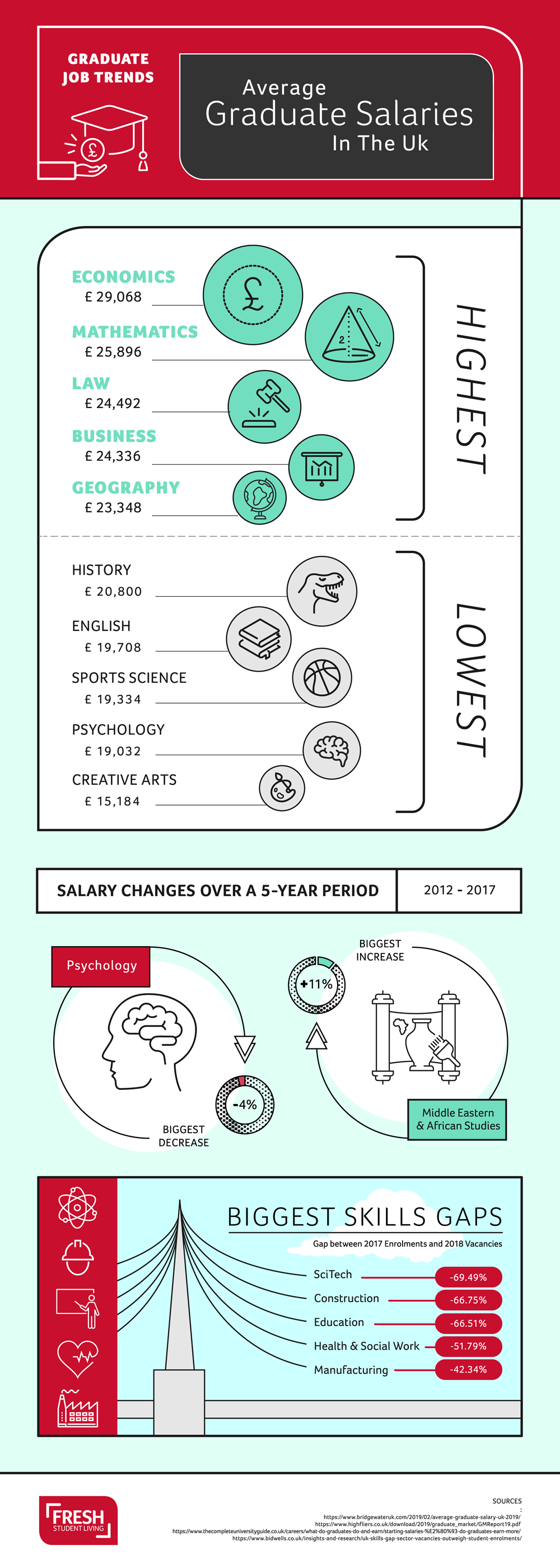New graduates are under strain – research has shown that 81% of students admit to feeling pressured to find a job within just six months of graduating, with 82% saying they want to earn money or have a disposable income.
After a long, hard slog through lectures and exams to the “promised land” of graduation, what’s behind this stress our students are feeling? What are the salaries and job market conditions they should be expecting after they graduate?
Average Starting Salaries in the UK
The average graduate salary in the country is estimated to be between £19,000 and £23,000, although some industries (such as finance, insurance and investment banking) start higher at £25,000 and upward.
Starting Salaries by Subject
According to research in the UK, the subjects students study have a major impact on their starting salaries. The top five were:
| Subject | Average Starting Salary |
| Economics | £29,068 |
| Mathematics | £25,896 |
| Law | £24,492 |
| Business | £24,336 |
| Geography | £23,348 |
The lowest five were as follows:
| Subject | Average Starting Salary |
| History | £20,800 |
| English | £19,708 |
| Sports Science | £19,334 |
| Psychology | £19,032 |
| Creative Arts | £15,184 |
Have average starting salaries changed significantly over the past few years? A recent graduate market report painted quite a rosy picture for graduates, placing the average starting salary at around £30,000 and finding that the figure has stayed unchanged since 2015.
The truth is that graduate salaries are constantly in flux. A comparison between 2012 and 2017 salaries for graduates in certain fields demonstrates a significant change over a 5-year period:
| Subject | 2012 | 2017 | Increase/Decrease (adjusted for inflation) |
| Psychology | £21,385 | £20,360 | -4% |
| Economics | £29,351 | £28,287 | -3% |
| History | £23,326 | £22,404 | -3% |
| Mathematics | £27,432 | £26,415 | -3% |
| Geography | £22,770 | £22,144 | -2% |
| Law | £21,605 | £21,135 | -2% |
| Business & Management | £24,689 | £24,437 | -1% |
| Sports Science | £20,839 | £20,447 | -1% |
| Art & Design | £20,132 | £19,746 | -1% |
| English | £20,279 | £20,186 | 0% |
Of the 10 subjects listed above Psychology, Economics and History saw the most significant drops over this period, while English saw the smallest change. Interestingly, the comparison also showed that Middle Eastern & African Studies saw a significant increase in graduate salaries, rising from £21,736 to £24,195 (an adjusted increase of 11%).
Hard-to-Fill Graduate Jobs
By comparing industry vacancies for a particular year to student enrolments the previous year, we can see how big the skills gap is in certain industries. Research by a prominent real estate company identified major skill gaps in several subjects.
These are the areas where graduates are most likely to find employment when they enter the job market – but because of the skills gap, not many of them will have the right qualifications to enter these fields. Bridging courses and online boot camps can help to close the gap and enable more students to find employment quickly after graduation.


